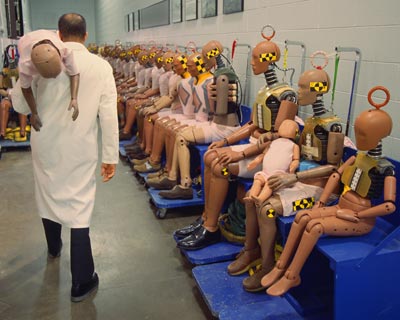From “Avoiding Our Dystopian Robot Future” at the Philosopher’s Beard, a passage that speculates on how an autonomous society that’s also a capitalist one might reconcile itself:
“The first dystopian threat has been well analysed by lots of people (eg, eg, eg). At present our political economy provides individuals with purchasing power claims on goods and services mainly through the labour market. That is, most people provide for themselves (and their dependents) by finding a job that pays enough to afford to buy what they need for a basic standard of living, and at least some of what they want as well. Government welfare policy is mainly oriented to supporting this central labour market mechanism, for example by providing public education for people to improve their employability, and social insurance nets for the disabled and temporarily unemployed.
The problem that robots pose is that they may make this labour market obsolete by causing ‘technological unemployment’ for humans. If robots can not only perform mechanical tasks more quickly, accurately, and tirelessly than humans (the problem the Luddites confronted), but also cognitive tasks (like exam grading, driving, legal discovery, etc) then what will humans have left to sell on the labour market? Our birthright – the ability to use our bodies and minds to create things that others find valuable – will be worthless. Yet people will still need food, shelter, and the rest. How will they get it?
Robots will revolutionise the supply side of the economy, resulting in much cheaper goods and services. Yet the economic gains of this efficiency will not be split between labour (wages) and capital (profits), since robots don’t need to be paid. Thus the owners of capital – the owners of the machines – will end up with an increasingly large share of whatever income the economy generates. (The ratio under capitalism 1.0 has historically been about 2/3 labour, 1/3 capital.) The pessimistic conclusion is that the society of the future would be characterised by an unimaginable abundance that only a very few can afford to buy.
Yet perhaps that scenario is not so likely. Not only can one expect the political mobilisation of the 99% objecting to their economic disenfranchisement. There is also a contradiction in the capitalists’ own position. For robots, unlike humans, are not consumers. That is part of what makes them so cheap to use in producing goods and services. Yet at the aggregate level that is a big problem. If no one (except the handful of capitalists, software designers, and hangers on) can afford to buy what you’re selling, then it hardly matters how cheaply you can produce it. Such an economy will be relatively small (‘depressed’) despite its enormous potential, and thus the capitalists as a class will be poorer than they might be.
Given the convergence of the interests of both capitalists and ordinary citizens, it seems reasonable to expect that some kind of accommodation can be reached to transform the political economy to cope with the end of human labour. Specifically, governments will have to reorient themselves from supporting citizens’ opportunity for waged labour to providing them with a direct rights claim on economic purchasing power (like pensions). Income is now redistributed from capitalists to ordinary citizens through the labour market. In future it will have to be redistributed through another mechanism, whether that be direct corporate taxation or perhaps some system of universal share ownership. That would be a radically different political economy than we have had for the last couple of hundred years. Call it Capitalism 2.0.”•
______________________________
Rod Serling, 1964:

